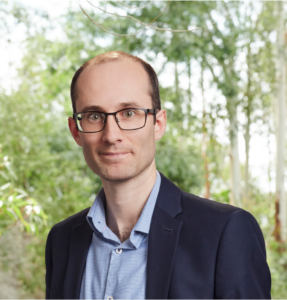What led you to a career in climate change?
I actually started out as an engineer in the oil & gas industry. This experience really made me appreciate the realities of our current energy systems and realise the sheer scale of the low-carbon energy transition that is required for keeping temperature rise below 1.5°C. However, I wanted to be part of accelerating that transformation, so decided to switch my career to focus on thinking through solutions to the climate and nature crisis. Climate change is the greatest challenge modern humans have ever faced – I want to be a part of tackling the challenge head on.
What does your role at Pollination involve?
I work with many of our corporate and financial service clients, helping them to understand the transition and physical risks they face, the opportunities they can capitalise on, and the governance and strategy that is required to navigate through to a net zero, nature positive future. I work with clients to set and implement robust targets across areas such as emissions, water, circularity, and nature.
What do you enjoy most about the role?
I enjoy thinking through real-world solutions to tackling the climate crisis and collaborating with my Pollination colleagues and with clients to understand the practical realities in how these can be implemented.
What makes Pollination different?
Pollination’s sharp focus on accelerating the transition to a net zero, nature positive future makes it unique compared to other advisory and investment firms. Pollination has purpose, and despite its employees being drawn from across diverse cultures, industries and disciplines, we all share in the firm’s mission. This focus, combined with being a relatively young but fast growing company makes Pollination a special place to work.
What do you hope to achieve in your career?
The median IPCC scenario for achieving 1.5°C of global warming requires net zero emissions by 2050. Come 2050 I will be in my early 60s, and perhaps starting to think about retirement. I would like to retire seeing humankind achieve net zero emissions by 2050 and knowing that I played a small part in helping us get there!
What makes you optimistic about the future?
Humankind has shown it is capable of achieving great things. The pace and solutions required to tackle the climate crisis often blows my mind but when you look back at history, at the industrial revolution for example, rapid change is possible. In the words of David Attenborough, “A new industrial revolution, powered by millions of sustainable innovations, is essential, and is indeed already beginning.” More and more we are seeing that addressing climate change makes good business sense, and when moral logic and economic sense come together it makes for a powerful combination!
We are recruiting. For more information about career opportunities at Pollination, please visit our LinkedIn job board at https://rb.gy/j1iktk or contact careers@pollinationgroup.com
